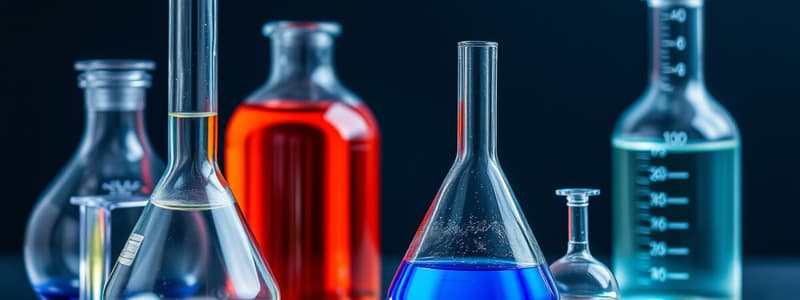Podcast
Questions and Answers
What is the base unit for mass in the metric system?
What is the base unit for mass in the metric system?
- Gram (correct)
- Liter
- Meter
- Cubic centimeter
Convert 4.25 mL to quarts (qt).
Convert 4.25 mL to quarts (qt).
- 0.0011 qt
- 0.0011 qt
- 0.0045 qt (correct)
- 0.0012 qt
What is the base unit for length in the metric system?
What is the base unit for length in the metric system?
- Kilogram
- Meter (correct)
- Liter
- Second
During a physics experiment, an electron is accelerated to 93 percent of the speed of light. What is the speed of the electron in miles per hour?
During a physics experiment, an electron is accelerated to 93 percent of the speed of light. What is the speed of the electron in miles per hour?
What is the base unit for volume in the metric system?
What is the base unit for volume in the metric system?
Which of the following is an example of a quantitative observation?
Which of the following is an example of a quantitative observation?
Which separation technique is based on differences in the volatility of the substances to be separated?
Which separation technique is based on differences in the volatility of the substances to be separated?
What does SI stand for in SI units?
What does SI stand for in SI units?
Flashcards are hidden until you start studying
Study Notes
Gasoline and Water Interaction
- Gasoline is less dense than water, leading to two distinct layers when mixed.
- The gasoline will float on top of the water due to its lower density.
Base Units in the Metric System
- The base unit for mass is the kilogram (kg).
- The base unit for length is the meter (m).
- The base unit for volume is the liter (L).
Conversions
- 4.25 mL is approximately 0.00112 quarts (qt).
- 6.91 mg converts to approximately 0.000243 ounces (oz).
Water Bed Mass Calculation
- The mass of water in a water bed depends on its dimensions and can be calculated using the volume (in liters) multiplied by the density of water (1 kg/L).
Control Variables in Experiments
- Control variables are essential to ensure a fair test by keeping certain factors constant, isolating the independent variable's effects.
Reporting Measurement Data
- Total volume of water added from different containers can typically be reported to the least precise decimal place of the measurements taken.
Electron Speed in Physics Experiment
- An electron accelerated to 93% the speed of light (c) travels at approximately 174,920 miles per hour (mph).
Metric Relationships
- Identifying incorrect metric relationships is crucial for ensuring comprehension of unit conversions and application in scientific contexts.
Measurement Observations
- A quantitative observation is one that involves numerical data, such as the height of a liquid or the mass of an object.
Separation Techniques
- Separation techniques like distillation rely on the volatility differences of substances for effective separation.
Density Calculations
- Density can be calculated by mass divided by volume.
- The density of zinc can be determined from the change in water level when submerged.
- Density of uranium hexafluoride can be calculated from given mass and volume data.
Metric Prefixes
- Metric prefixes from smallest to largest are: milli-, centi-, deci-, kilo-.
SI Units
- SI stands for Système International, which is the international system of measurement used in scientific contexts.
Manganese Content in Body
- To calculate the grams of manganese for a person weighing 206 lbs, convert weight to kilograms and apply the known body manganese concentration.
SI System Units
- Familiarity with units in the SI system is essential; non-SI units include traditional measurements like inch or pound.
Studying That Suits You
Use AI to generate personalized quizzes and flashcards to suit your learning preferences.




